Here are several key takeaways about U.S. opinion of the war between Russia and Ukraine:
- Democrats and Republicans are divided – and this divide has grown wider – when it comes to U.S. responsibility to help Ukraine defend itself and levels of concern over possible conflict outcomes.
- The survey asked about how committed four world leaders are to lasting peace between Russia and Ukraine: French President Emmanuel Macron, Russian President Vladimir Putin, U.S. President Donald Trump and Ukrainian President Volodymyr Zelenskyy. A majority of Americans say Zelenskyy is committed to lasting peace, while 19% say the same of Putin. Fewer than half (47%) say Trump is committed to peace, and 45% say this of Macron.
U.S. responsibility to help Ukraine
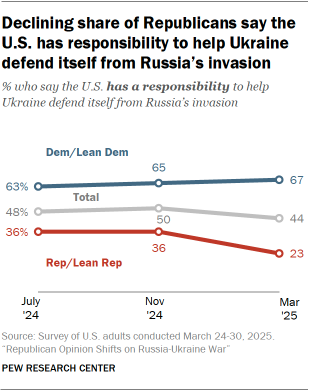
More than four-in-ten Americans (44%) say the U.S. has a responsibility to help Ukraine defend itself from Russia’s invasion, while 53% say the nation does not have this responsibility.
Views on this issue have shifted over recent months. Fewer Americans now believe the U.S. has a responsibility to help Ukraine in its war against Russia than said so in a November 2024 survey fielded after the U.S. presidential election. At that time, 50% held this opinion.
Partisanship and age
Opinion on the United States’ responsibility to Ukraine is divided along partisan lines. Two-thirds of Democrats and Democratic-leaning independents say the U.S. has a responsibility to help Ukraine defend itself, compared with 23% of Republicans and Republican leaners.
The share of Republicans who believe the U.S. should aid in Ukraine’s defense has dropped 13 points since November, while the share of Democrats who say the same is largely unchanged over the same period.
Partisans are also divided by age. Republicans and Democrats ages 50 and older are more likely than their younger counterparts to say the U.S. has a responsibility to help Ukraine.
National and personal importance of the Russia-Ukraine war
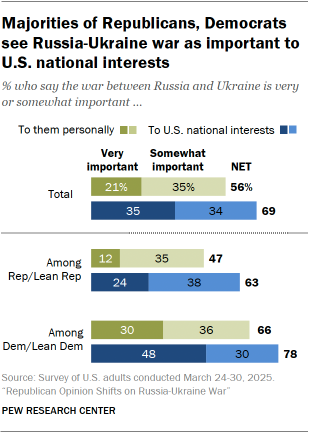
Roughly seven-in-ten Americans (69%) view the war between Russia and Ukraine as important to U.S. national interests.
A 56% majority of U.S. adults also say the Russia-Ukraine war is at least somewhat important to them personally.
Partisanship and age
Views of the war’s national and personal importance vary by party. Democrats are more likely than Republicans to say that the war is important on both counts.
Liberal Democrats are especially likely to say the Russia-Ukraine war is important both to U.S. national interests and to them personally: About nine-in-ten liberal Democrats (88%) say this, compared with 72% of conservative or moderate Democrats. Conservative Republicans are more likely than liberal or moderate Republicans to view the war as important to U.S. interests (66% vs. 58%).
The share of Republicans who say the war between Russia and Ukraine is important to them personally has dropped by 9 points since January 2024, and the share who say it is important to U.S. interests has dropped by 6 points. In comparison, views of the war’s personal importance among Democrats remain unchanged over the same period, and the share of Democrats who see the war as important to U.S. interests has declined by only 3 points.
Views also vary by age more generally, with older U.S. adults more likely to consider the Russia-Ukraine war important personally and nationally. About three-quarters of Americans ages 65 and older say the war is at least somewhat important to them personally, while half of adults under 30 say the same. There’s a similar gap in the shares of older and younger Americans who see the war as at least somewhat important to U.S. national interests (81% vs. 61%).
Differences between older and younger adults are evident among both Republicans and Democrats. Older Republicans (those ages 50 and older) are more likely than younger Republicans ages 18 to 49 (70% vs. 56%) to say the Russia-Ukraine war is important to U.S. national interests. And older Democrats are more likely to say this than younger Democrats (84% vs. 73%). This pattern holds on the question of the war’s personal importance.
Views of Russia
Americans who consider Russia an enemy of the U.S. are more likely than those who view Russia as a partner or competitor to see the war as important both to U.S. interests and to themselves personally.
Roughly seven-in-ten of those who see Russia as an enemy (68%) say that the war is at least somewhat important to them personally, compared with 45% among those who see Russia as a competitor and 41% of those who see Russia as a partner. Differences by views of Russia also exist on the question about national importance.
Concerns about possible outcomes of the Russia-Ukraine war
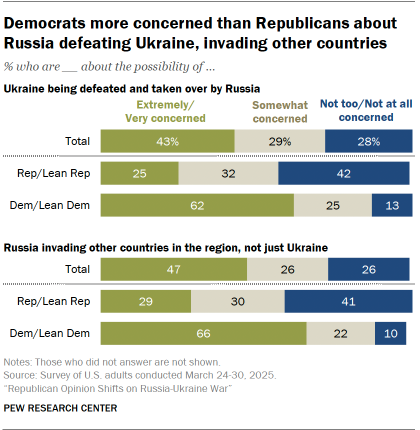
More than four-in-ten U.S. adults (43%) are extremely or very concerned about Ukraine possibly being defeated and taken over by Russia; another 29% are somewhat concerned and 28% are not too or not at all concerned.
Nearly half (47%) are extremely or very concerned about Russia invading other countries in the region, while 26% are somewhat and 26% not too or not at all concerned.
Concerns about both situations have not changed much over the past year, but are lower than when the public was first asked about these outcomes in the early months of Russia’s invasion. In April 2022, 55% were extremely or very concerned about a Ukrainian defeat, and 59% said the same about a wider Russian invasion.
Partisanship
Democrats have long been more likely than Republicans to say they are extremely or very concerned about both a possible Ukrainian defeat and a Russian invasion of other countries in the region.
But the partisan gap on each of these questions has grown wider over the past year. Today, 29% of Republicans are extremely or very concerned about Russia invading other countries in the region, down from 42% in July 2024. Democrats’ opinions have not changed as much.
World leaders’ commitment to lasting peace between Russia and Ukraine
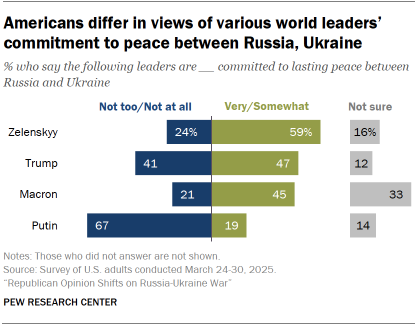
A majority of Americans (59%) say that Ukrainian President Volodymyr Zelenskyy is committed to lasting peace between Russia and Ukraine, while 47% say this about U.S. President Donald Trump and 45% about French President Emmanuel Macron (33% say they are unsure when asked about Macron).
Two-thirds of Americans say that Russian President Vladimir Putin is not committed to lasting peace between the two countries, including 42% who say Putin is not at all committed to this outcome.
Partisanship
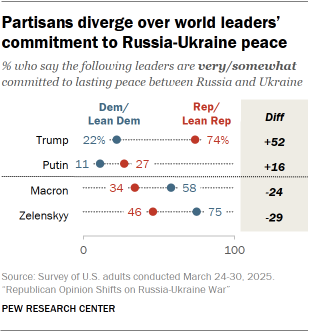
Republicans are more likely than Democrats to say that Trump and Putin are at least somewhat committed to lasting peace between Russia and Ukraine. But Democrats are more likely to say this about Zelenskyy and Macron.
Confidence in Zelenskyy
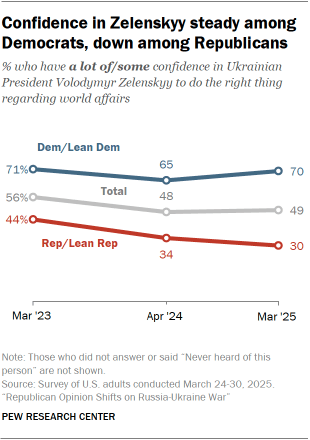
Americans have mixed views of Zelenskyy, just a few weeks after his contentious White House meeting about U.S. support for Ukraine in the war. Roughly half of Americans (49%) have a lot or some confidence in his ability to do the right thing regarding world affairs, compared with 42% who have not too much or no confidence in him. Another 9% say they have never heard of the Ukrainian leader.
Zelenskyy’s rating is mostly unchanged from 2024. But it’s down since 2023, when 56% had a lot or some confidence in him.
Partisanship and age
Zelenskyy receives much higher confidence ratings from Democrats (70%) than from Republicans (30%).
This represents a slight uptick since 2024 among Democrats (+5 points) and a slight decline among Republicans (-4 points) and marks the widest partisan gap on confidence in Zelenskyy since we first asked this question in 2023. Liberal Democrats are especially likely to express confidence in Zelenskyy (81%).
There continue to be age differences on confidence in Zelenskyy. Around four-in-ten Americans ages 18 to 29 (42%) have confidence in the Ukrainian leader, compared with 60% of those ages 65 and older. Younger Americans are also much more likely than older Americans to say they never heard of Zelenskyy (15% vs. 3%).




